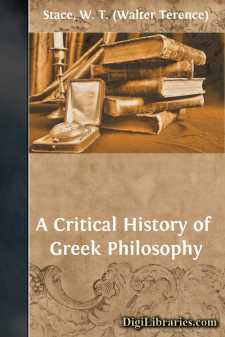Categories
- Antiques & Collectibles 13
- Architecture 36
- Art 48
- Bibles 22
- Biography & Autobiography 813
- Body, Mind & Spirit 142
- Business & Economics 28
- Children's Books 17
- Children's Fiction 14
- Computers 4
- Cooking 94
- Crafts & Hobbies 4
- Drama 346
- Education 46
- Family & Relationships 57
- Fiction 11829
- Games 19
- Gardening 17
- Health & Fitness 34
- History 1377
- House & Home 1
- Humor 147
- Juvenile Fiction 1873
- Juvenile Nonfiction 202
- Language Arts & Disciplines 88
- Law 16
- Literary Collections 686
- Literary Criticism 179
- Mathematics 13
- Medical 41
- Music 40
- Nature 179
- Non-Classifiable 1768
- Performing Arts 7
- Periodicals 1453
- Philosophy 64
- Photography 2
- Poetry 896
- Political Science 203
- Psychology 42
- Reference 154
- Religion 513
- Science 126
- Self-Help 84
- Social Science 81
- Sports & Recreation 34
- Study Aids 3
- Technology & Engineering 59
- Transportation 23
- Travel 463
- True Crime 29
A Critical History of Greek Philosophy
Description:
Excerpt
PREFACE
This book contains the substance, and for the most part the words, of a course of public lectures delivered during the first three months of 1919. The original division into lectures has been dropped, the matter being more conveniently redivided into chapters.
The audience to whom the lectures were delivered was composed of members of the general public, and not only of students. For the most part they possessed no previous knowledge of philosophy. Hence this book, like the original lectures, assumes no previous special knowledge, though it assumes, of course, a state of general education in the reader. Technical philosophical terms are carefully explained when first introduced; and a special effort has been made to put philosophical ideas in the clearest way possible. But it must be remembered that many of the profoundest as well as the most difficult of human conceptions are to be found in Greek philosophy. Such ideas are difficult in themselves, however clearly expressed. No amount of explanation can ever render them anything but difficult to the unsophisticated mind, and anything in the nature of "philosophy made easy" is only to be expected from quacks and charlatans.
Greek philosophy is not, even now, antiquated. It is not from the point of view of an antiquary or historian {vi} that its treasures are valuable. We are dealing here with living things, and not with mere dead things--not with the dry bones and debris of a bygone age. And I have tried to lecture and write for living people, and not for mere fossil-grubbers. If I did not believe that there is to be found here, in Greek philosophy, at least a measure of the truth, the truth that does not grow old, I would not waste five minutes of my life upon it.
"We do not," says a popular modern writer, [Footnote 1] "bring the young mind up against the few broad elemental questions that are the questions of metaphysics.... We do not make it discuss, correct it, elucidate it. That was the way of the Greeks, and we worship that divine people far too much to adopt their way. No, we lecture to our young people about not philosophy but philosophers, we put them through book after book, telling how other people have discussed these questions. We avoid the questions of metaphysics, but we deliver semi-digested half views of the discussions of, and answers to these questions made by men of all sorts and qualities, in various remote languages and under conditions quite different from our own. . . . It is as if we began teaching arithmetic by long lectures upon the origin of the Roman numerals, and then went on to the lives and motives of the Arab mathematicians in Spain, or started with Roger Bacon in chemistry, or Sir Richard Owen in comparative anatomy .... It is time the educational powers began to realise that the questions of metaphysics, the elements of philosophy, are, here and now to be done afresh in each mind .... What is wanted is philosophy, and not a shallow smattering of the history of philosophy ......


